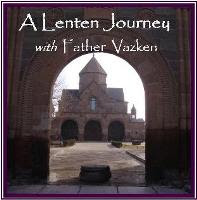Day 2: Fasting: Abstaining from Food and Drink
“And whenever you fast do not look dismal like the hypocrites, for they disfigure their faces to show the others that they are fasting. Truly, I tell you, they have received their reward. When you fast, put oil on your head and wash your face so that your fasting may not be seen by others but by your Father who is in secret. And your Father who is in secret will reward you.” ~Jesus (Sermon on the Mount, Matthew 6)
Lenten Recipe

Yesterday we took a general look at the Lenten period and noted the instruction given to us in Holy Scripture regarding almsgiving, prayer and fasting. Of these three, fasting is the most pronounced when it comes to Lent.
Often, people understand that Lent is a period of time when we “give up” something. We are familiar with Mardi Gras, which means “Fat Tuesday.” It is the day before Lent where anything goes because the on the following day, Ash Wednesday, the period of deprivation begins. For us in the Armenian Orthodox tradition, we are already in the Lenten cycle – two days before Ash Wednesday. Lent begins on Monday, so“Fat Tuesday” is actually Fat Sunday. In Armenian we refer to last Sunday, the day before Lent as Poon Paregentan. It is a compound word meaning “Good” (pari) and “Living” (gentan) = the day of Good Living.
As for dietary habits, the Armenian Orthodox Church clearly pronounces a menu. For us, we abstain from all animal and animal products. That is, no meats, no poultry, no fish as well as their products. No milk, cheese and dairy products. Basically, we bring it down to a vegan diet. It is a beautiful opportunity to clean our systems during Lent. But be careful. Sometimes people look at Lent, especially the fasting rituals, as an opportunity to drop some pounds or to lower cholesterol. That is not what it’s about. You do not fast to lose weight. You do not fast to drop your cholesterol levels.
The purpose of these dietary restrictions is to reminds us of what is essential in our lives. During Lent we strip away all the excesses, we purge our system of the toxins and we find what we need to live. Think of Jesus in the wilderness. For 40 days and 40 nights he fasted and then he was tempted. “Change theses stones into bread,” said the Tempter. “Man does not live by bread alone but by every word that proceeds from the Lord,” response Jesus. These words must guide us in our fasting and dietary discipline. What do we need in our lives? What is essential for us to live? What is being spoken to us?
John Jesus says, “I came that you might have life and have it abundantly.” That abundant life should reflect a life filled with passion, victories, love and happiness. I’m not talking about superficial happiness, but the one that comes from within, when we live a life of purpose and full of meaning.
When we fast, we stay away from certain foods. We clean out our systems, yes, but at the same time we are reminded of the necessities of life, that is, what is necessary to life? If you take a personal inventory of your life, you’ll find that most everything that you have falls into the “excess” category. There is so little that you really need to survive. But that too is a challenge. God does not call us to live a life without those excesses.
In the Armenian Church there is a practice to bless the homes. A family invites the priest into their home, and place bread, water and salt on a table, for this blessing. The bread is blessed for the physical needs of the family. We bless water for the spiritual fidelity of the family. And equally important, we bless salt, to remind us that life has to have flavor. Life is beautiful and it is meant to be lived in excess – to love in excess, to smile in excess, to care in excess. Lent is not about forgoing the excess but to inspect and find what are the excesses that we can live without and what are those things – the smile, love, care – that we need to increase, fill our lives and live the abundant life.
Today with this lesson on fasting, I invite you to really take an inventory of your life. What is really necessary to get through? What is necessary to survive? And what is really necessary in your life to enjoy? You will find that taking an inventory gives you a unique insight into your life and living practices. You will find that the necessities of life are in the acts of love, kindness and charity. These are what define us as people and make us truly worthy to be called children of God.
We conclude with one of the prayers of St. Nerses Shnorhali, (Verse 16 from Havadov Khosdovaneemk):
Oh my God, who opens your hands and fills all things living with your bounty, to you I commit my soul. Do care for me and provide for the needs of my soul and body forever. Have mercy upon all your creatures and upon me, a great sinner. Amen.



